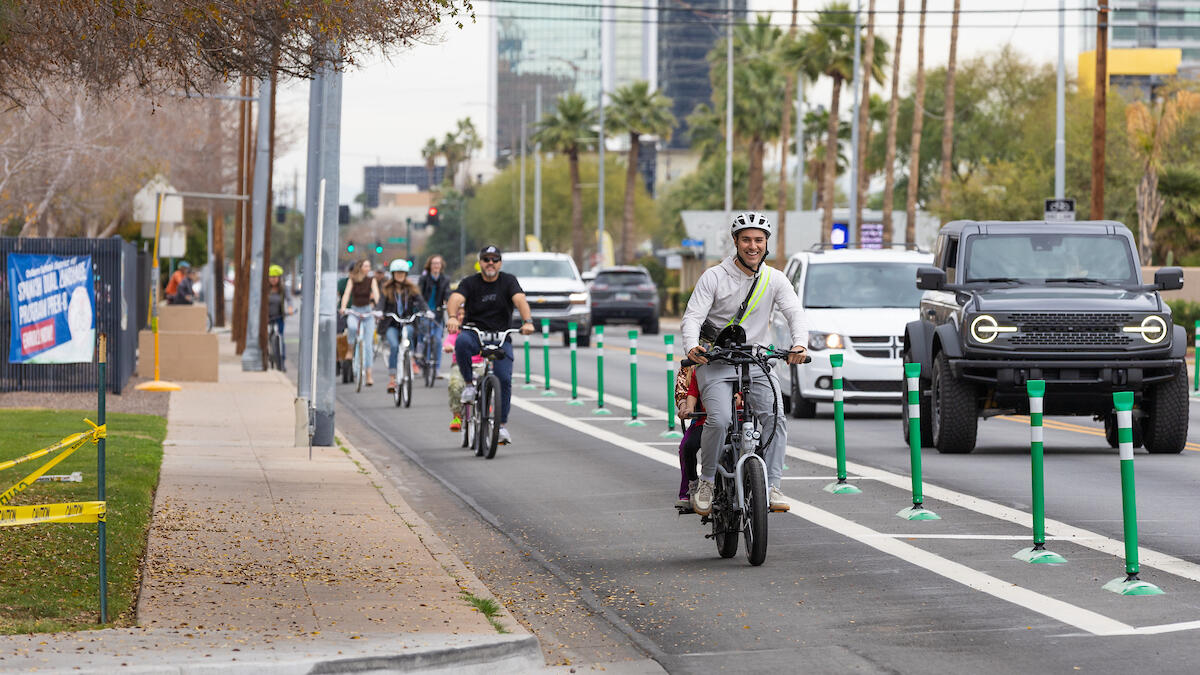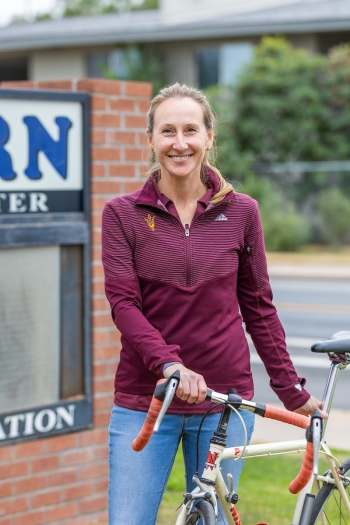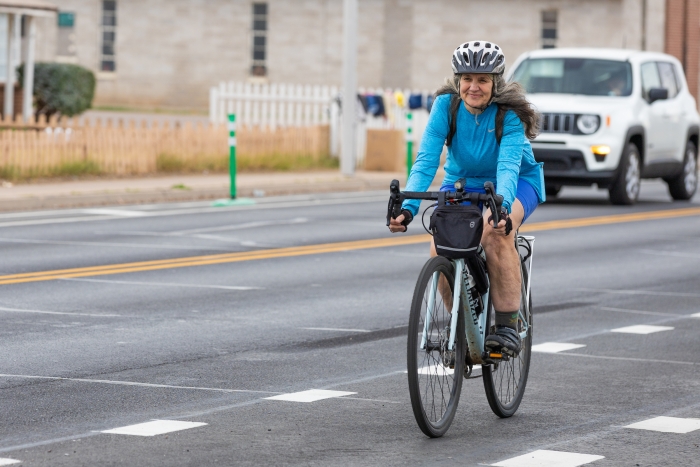A road safer traveled

Bikers ride the newly upgraded bike lane during a community bike ride event in Phoenix on Jan 20. Photo by Emma Fitzgerald/Arizona State University
It’s just after 1 p.m. on Saturday when the 30 or so cyclists spread out single file in the bike lane, just west of Osborn Road and 11th Avenue in Phoenix.
It’s a beautiful day for a ride. The skies are cloudy, the temperature cool. The bikers — adults and kids alike — head west on Osborn toward 19th Avenue, buffered from the single lane of traffic by green barriers spread out every few feet.
For years — decades even — this ride wasn’t possible. There were no bike lanes on the eight blocks between 11th Avenue and 19th Avenue, and cars zoomed by in the two lanes of traffic going both ways, often exceeding the 35-mph speed limit.
“I heard from a lot of parents and community members that they really wanted to walk or ride their bikes to school with their kids, and they didn’t feel safe doing so,” said Edward Hermes, founder of the Encanto-Clarendonnamed for Encanto Elementary School and Clarendon Elementary School, both situated in the high traffic area Safe Routes to School committee. “It was a very terrible and dangerous situation. We had several instances of cars going too fast, jumping the curb and actually hitting the fences in front of school.”
That’s no longer a concern, thanks to Allison Poulos, an assistant professor in Arizona State University’s College of Health Solutions, and a team of 10 students from across the university whose surveys and on-site data collection led the city of Phoenix to create the protected bike lanes on Osborn Road.
“There was no way I’d let my kids ride on the street before,” said Eric Thompson, a father of a preschooler and second-grade student at Encanto Elementary, as he awaited the start of the community bike ride. “Now I feel a lot more comfortable having them do that.”
Poulos was contacted by the city of Phoenix in 2021 in part because she had worked with a federal program called Safe Routes to School. Also, her research centers around children’s health and physical activity among children in school and neighborhood settings.
Poulos’ charge was to collect data and make a presentation to the Safe Routes to School Committee, which was working in conjunction with the city of Phoenix.
Poulos’ team, which largely consisted of students in the College of Health Solutions and the Mary Lou Fulton Teachers College — Professor Pamela Kulinna worked with Poulos as well — conducted a survey of parents and caregivers of students attending the three schools (St. Gregory Catholic School being the third) located between 11th and 19th avenues.
Their survey found that while most families lived within a mile of their school, only 13% of the children regularly walked or biked to school, and 80% of the parents cited the amount and speed of traffic on Osborn Road as influencing their decision to walk/bike to school.
The team also conducted on-site assessments, walking the eight blocks multiple times a day, at the beginning of school and the end of school, tallying the number of drivers on the roads, whether there were crosswalks, flashing lights, speed cameras, speed limit signs and whether the road met the standards of the Americans with Disabilities Act.
Poulos said the data compiled by her team helped change the minds of parents who initially didn’t want to reduce the lanes of traffic.
“They didn’t want to have fewer lanes available,” Poulos said. “We showed them just how many people want to use the area to walk and bike, in addition to a lot of parents’ concern about safety.”
Hermes called the work of Poulos and her team “invaluable,” and said that they were “absolutely wonderful to work with.”
“They really helped us shape what the community wanted, and that led to recommendations from our committee to the district governing board,” he said. “And then those recommendations were voted on unanimously and sent to the city of Phoenix.”
Hermes said he’s thankful not just for the bike lanes but the barriers separating the lanes from traffic.
“We’ve not only created a safe place to bike, but it also creates a buffer for people walking on the sidewalk so they’re not walking almost on top of cars going 40 miles an hour,” he said.
Ernie Martinez has lived in the neighborhood around Osborn Road for 16 years and has a daughter who attends St. Gregory. As he sat on his bicycle, waiting for Hermes to lead the group on the ride, he expressed gratitude for ASU’s work on the project and the end result.
“It’s just a lot safer,” he said. “I think it’s great that our kids now get to get some exercise riding to school, and us as parents can jump on our bikes to pick them up.”
More Health and medicine

Reducing waste in medical settings
Health care saves lives, but at what cost? Current health care practices might be creating a large carbon footprint, according to ASU Online student Dr. Michele Domico, who says a healthier…

ASU offers bilingual counseling to Spanish speakers
Arizona is one of the five states in the nation with the highest percentage of Hispanic residents, according to the U.S. Department of Health and Human Services Office of Minority Health, and …

College of Health Solutions launches first-of-its-kind diagnostics industry partnership to train the workforce of tomorrow
From 2007 to 2022, cytotechnology certification examinees diminished from 246 to 109 per year. With only 19 programs in the United States, the cytology workforce that stands at the front line of…



